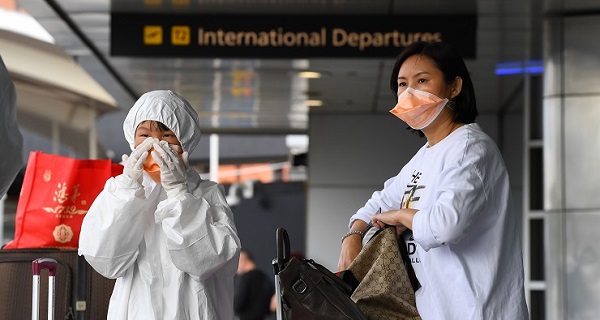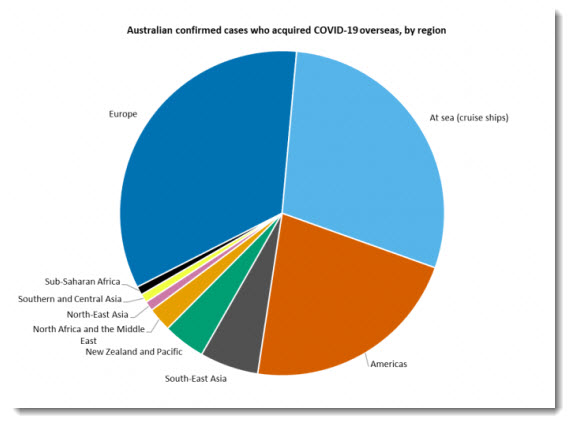
With Australia’s apparent success in limiting COVID-19, it appears that victory has many fathers.
But while Scott Morrison’s approval rating skyrockets, our government’s response to many aspects of dealing with the pandemic has been more than slightly tinged in xenophobia.
The China ban
Morrison, like his good friend Donald Trump, was very quick to enact a ban on non-Australian citizens or permanent residents who had been (or even transited through) mainland China.
The decision to block visitors from China was pragmatic (and brave given the importance of Chinese students and tourists to the economy and the insistence by China that the decision was an overreaction). But while that move was no doubt correct in hindsight, it had a major flaw. The decision to only ban non-Australians ignored the fact that COVID-19 doesn’t delineate between citizenship.
Some of the thousands Australian permanent residents and citizens who returned from China unwittingly brought the virus with them and there were, at first, absolutely no precautions at airports or any sort of quarantine requirements.
In short, even in its small policy successes, the government managed to completely fail.
Moreover, as global pandemic risk increased, the government and its medical advisers were far too slow to ban and quarantine people arriving from continental Europe and the US. Travel from Italy was finally restricted on March 10 (again, with no forced quarantine requirements), while the rest of Europe and the US (which had become hotbeds of COVID-19 by then) weren’t restricted until March 15.
By then, hundreds of wealthy skiers had returned from Aspen and were spreading the virus through soirees and garden parties across the nation.
Only a small fraction of infected Australians came from China — the vast majority breezed in from Europe and the US, or strolled off cruise ships. Had the government been as quick to ban wealthy white skiers and cruisers as they were Chinese visitors, the virus’ spread would have been limited dramatically.

We don’t want your money
It certainly wouldn’t be the first time that a government used a major distraction to usher through controversial policy, but Josh Frydenberg’s move to ban foreign companies from buying Australian assets without approval from the Foreign Investment Review Bureau was as mystifying economically as it was xenophobic.
The government justified the ban on the basis of two Chinese-owned property developers allegedly sending more than 100 tonnes of equipment back to China.
This of course has absolutely nothing to do with overseas capital purchasing Australian businesses (even though China is now sending even more equipment back to Australia, and exporting goods could have been easily restricted).
Senior lawyers have told Crikey that the government move has already led to several acquisitions of Australian businesses being kyboshed, with the Australian economy quickly deprived of valuable capital as it approached a potential economic depression.
Frydenberg claimed that “the measures are necessary to safeguard the national interest as the coronavirus outbreak puts intense pressure on the Australian economy and Australian businesses” and that they are “temporary measures that will remain in place for the duration of the current crisis”.
But he would say that wouldn’t he.
All workers are essential (unless you weren’t born here)
The largely well-intentioned JobKeeper policy is another example of xenophobia unwittingly influencing Australia’s economic response.
While Australian casuals earning $500 week will suddenly be getting a massive pay rise, overseas-born workers on minimum wage washing dishes all day will get nothing. They’re not covered by JobKeeper, which incentivises employers to fire them (while keeping employees covered by JobKeeper on the books).
Singapore, which has been hit by waves of infections in tightly-packed dormitories occupied by foreign workers, has setup a task force specifically to assist foreign workers, stating that it “recognises the potential contributions of NGOs and deeply appreciates their cooperation. We have started to coordinate efforts with NGOs that have voluntarily stepped forward”. The Straits Times reported that “besides catering to the workers’ daily needs, the task force is working with charity HealthServe to provide free virtual counselling sessions”.
For non-Australian workers, most of whom would be on skilled (457) visas, have been paying tax and contributing to Australian society, Scott Morrison’s advice was simple: “go home”.








There is an article in today’s Conversation about migrant workers in Singapore. Whatever the government says, their situation doesn’t look like a good one.
“overseas-born workers on minimum wage washing dishes all day will get nothing. They’re not covered by JobKeeper, which incentivises employers to fire them (while keeping employees covered by JobKeeper on the books).”
If only there was a way to incentivise their “employers” to support them rather than expecting a bail out???
“Josh Frydenberg’s move to ban foreign companies from buying Australian assets without approval from the Foreign Investment Review Bureau was as mystifying economically”.
Yeah, well crap. There is very little reason to think we are somehow held aloft purely by the beneficience of overseas capital, but with our superannuation treasures we don’t actually need them. They don’t actually bring much needed capital, what they generally bring us a little bit of entrepreneurship, which our business class entirely lacks. Capital isn’t our problem, and foreign capital just ships out our profits.
But, you know, carry on with these ideological talking points.
Morrison’s record as a manager of pandemics is far from encouraging. A useful guide to morrison’s competence with coronavirus is the way he when Border Generalissimo-MP handled the Ebola outbreak in Africa in West Africa in mid-’16. He simply banned all arrivals.
Epidemiologists warning of the issues relating to outbreaks of serious diseases like Ebola in West Africa in mid-’16 share the situation of climate change scientists, who now realise that people in influential positions generally won’t listen until they have to listen, and will opt for brutal failures rather than effective policies based on their pet hates of understanding and respect. What is surprising is how little the governments that funded that effort, including Australia, learned from in international efforts to contain Ebola. But under abbott and morrison, Australia did as little as possible to participate.
People banned from arriving will still come – via third countries – but will naturally try to avoid being “suspected” of infection by Border Generalissimo-MP Dutton and/or his RSHA – so naturally anyone conceivably infected will make great effort to avoid detection, rather than willingly coming forward for treatment. Trust matters.
Cuba’s ability to treat an Ebola outbreak then and the covid-19 outbreak now was then and is now far superior to ours because it is focussed on making the patient, the environment and the health system healthier. China is using Cuban technology to fight the coronavirus. For once the U.S. trade and travel blockade has advantages; limiting movement is the key barrier to spread, plus an incentive to do what many commentators here now suddenly urge, which is buy local.
Also, xenophobia has been driving the ilLiberal Party Right for decades. Hence the Muslim Terror fantasy that the Rightist media is still trying to sell us.